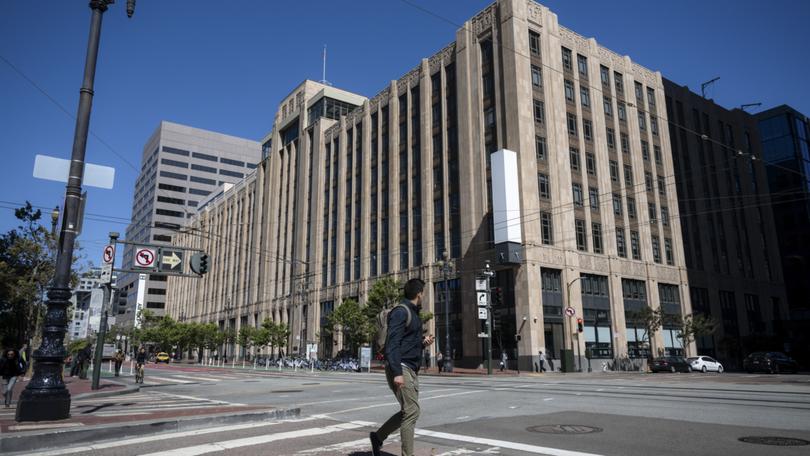Elon Musk’s X is leaving San Francisco. City officials say ‘good riddance’
San Francisco’s long relationship with X is nearly over — and city officials are far from heartbroken.

San Francisco’s long relationship with X is nearly over — and city officials are far from heartbroken.
Elon Musk is shuttering his social media company’s headquarters in a gritty downtown neighbourhood in the coming weeks and will move its last employees based there south to offices in Palo Alto and San Jose, California. New headquarters will be set up in Texas.
But city officials are not lamenting the exit. X bears little resemblance to the company that San Francisco wooed with a tax break more than a decade ago, when it was Twitter, to help anchor a budding tech hub in a downtrodden neighbourhood near City Hall known as Mid-Market. The pandemic, and Musk’s 2022 acquisition of the company and subsequent gutting of its workforce, reduced the headquarters to a ghost town.
Sign up to The Nightly's newsletters.
Get the first look at the digital newspaper, curated daily stories and breaking headlines delivered to your inbox.
By continuing you agree to our Terms and Privacy Policy.“I share the perspective that most San Franciscans have, which is good riddance,” said City Attorney David Chiu, who as a member of the city’s Board of Supervisors backed the tax break that lured Twitter to Mid-Market in 2012.
Twitter once symbolised San Francisco’s status as a startup capital. But the city’s nonchalant response to the move — amid public posts from Musk about San Francisco’s inflexible tax policies and liberal politics — shows officials are now less willing to cater to companies considering a move.
Musk and X did not respond to requests for comment.
Twitter was founded in San Francisco in 2006. In 2011, it threatened to forsake its hometown for tiny Brisbane, just over the city’s southern border, which wouldn’t levy payroll taxes.
San Francisco’s mayor then, Ed Lee, coping with the lingering effects of a recession and a nearly 10 per cent unemployment rate, proposed a so-called Twitter tax break. The deal would erase the 1.5 per cent payroll tax on new hires for certain companies in Mid-Market. Those companies would, in turn, create jobs and enliven a neighbourhood that struggled with crime, vacancies and homelessness.
After Twitter moved into the new headquarters at 1355 Market St., its payroll swelled from a few hundred to a few thousand people. The cavernous ground floor became home to upscale bars and restaurants — where people could eat antelope, elk and pig ears.
By 2017, 59 new companies had set up shop nearby, including Uber, Square and Zendesk. Several luxury apartment buildings went up. The boom helped expand the city Budget but also contributed to spiking housing costs.
Many of the tech companies also provided free food, so workers didn’t spend as much at local businesses as city leaders had hoped. The Twitter tax break ended in 2019, with politicians considering its success mixed.
Then came the pandemic. Offices emptied, and foot traffic dried up. Jack Dorsey, a Twitter co-founder and its CEO at the time, announced that employees could work from home forever.
In October 2022, Musk bought Twitter for $44 billion and soon slashed jobs. Last year, he renamed the company and erected on the roof a giant “X” sign that flashed at night, upsetting neighbours and landing him in trouble with the city.
“It’s like a zombie version of the old Twitter, and I think what a lot of people are feeling is: Just put this bird out of its misery,” said Yao Yue, a software engineer who worked at Twitter for 12 years and was let go after Musk’s takeover.
Musk, who clashed with state regulators over pandemic stay-at-home orders and has increasingly enmeshed himself in right-wing politics, recently indicated that he was souring on San Francisco. In July, he posted online that he had been trapped in the company’s garage “because a gang was doing drugs in the street and wouldn’t move!”
Musk said last month that he would move X’s headquarters to Austin, Texas, after California passed a law that bans school districts from requiring teachers to notify parents if their children change their gender identification. He also blamed San Francisco’s gross receipts tax, which taxes local businesses for transactions that take place outside city limits.
He said the tax unfairly penalises businesses that process payments — something he hopes X will do. “X could not remain in SF and launch payments, as it would immediately fail,” he posted in July.
Mayor London Breed said she met with Musk once several months ago and had texted with him. She said she had not offered X anything to stay but wanted to maintain good relationships with all CEOs in her city.
“I’m not going to beg anybody,” Breed said. “But I made it very clear that my goal is to ensure that companies succeed.”
She said she thought Musk’s political agenda had driven him out of San Francisco but did not elaborate.
Mid-Market is looking better than it did in the depths of the pandemic, but its office vacancy rate is 46 per cent, 10 points higher than the city as a whole. Uber and Square moved out, and Zendesk retains a small footprint but has bigger offices downtown. Already, X’s lobby is empty, and most businesses in the building have shuttered.
The city’s chief economist, Ted Egan, said X had shrunk so much already, its departure would matter little to the city’s coffers.
“In many respects, they were already gone,” he said.
This article originally appeared in The New York Times.
© 2024 The New York Times Company
Originally published on The New York Times
